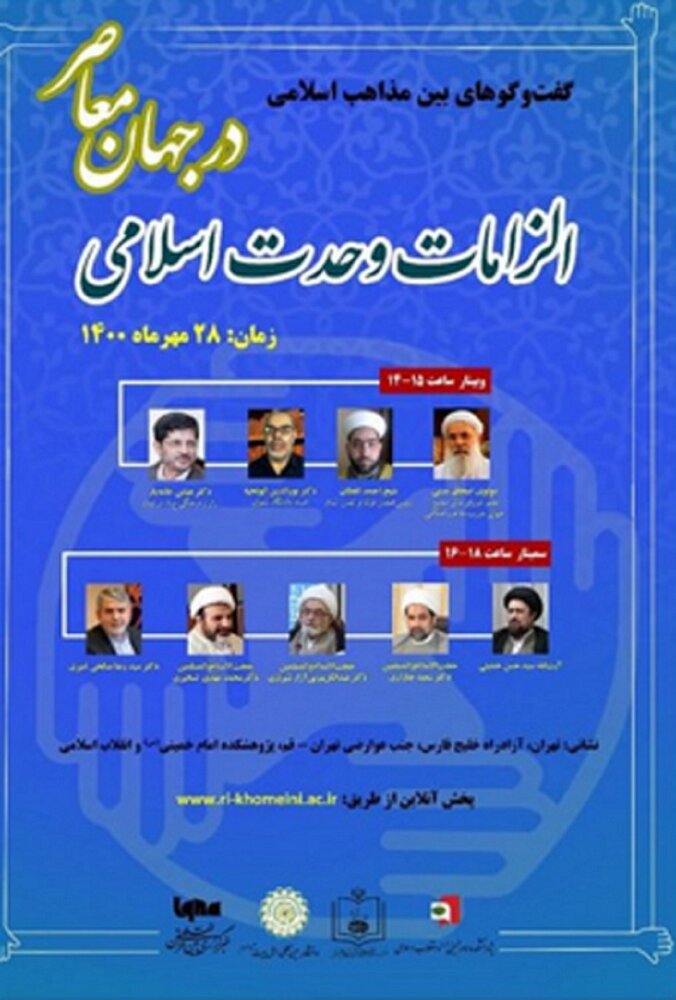Hawzah News Agency – Speaking at the international webinar, Iran"s Cultural Attaché in Beirut, Abbas Khameyar said differences regarding jurisprudential practices are a natural thing; The issue of unity is not a matter of integration; rather, it is paying attention to and committing to the common points of the Muslim Ummah.
According to the Public Relations Department of the Islamic Culture and Relations Organization (ICRO), Abbas Khameyar, speaking on October 19 in the international webinar of "Requirements of Islamic unity in the contemporary world on the occasion of Unity Week held in collaboration with Imam Khomeini Research Institute and the Islamic Revolution as well as the International University of the Ahl al-Bayt (AS) and the International Quran News Agency (IQNA) talked about challenges to the unification and proximity of Islamic schools of thought and strategies to confront the internal and external threats to Islamic unity.
Division; Priority of the enemies of Islam
Khameyar stated that the priority of the enemies is the issue of division, we should pay attention to the fact that the enemy pays special attention to the concept of unity and what is happening in the Islamic world today. In other words, today the re-division of the Islamic world is based on the "Sykes-Picot I" treaty signed in 1916 between France and Britain and different countries and the Ottoman Empire. Islam was disintegrated, and today, after more than a hundred years, this is happening again and again, and all the crises we see in the Islamic world today are only for the sake of the disintegration of Islamic countries.
Challenges facing unity
When we talk about unity and rapprochement, it does not mean the integration of religions, but it means believing in each other's views and practices, said Iran's Cultural Attaché in Lebanon adding that commitment and convergence are within the framework of common beliefs
He continued by saying that disagreements regarding jurisprudential methods are a natural thing; The issue of unity is not a matter of integration, and it is a kind of action, attention and commitment to our common points that we must keep in mind.
Takfir; A combination of ignorance and resentment
Khameyar added that the next point is the reactionary and very extreme view of religion, which has lead to emergence of takfiris, which is a combination of ignorance and hatred, and this approach is in the thinking of some people who bear the name of religion. Takfir is the combination of ignorance and enmity and hatred. The second challenge that has led to a kind of apostasy is the elimination of the close tie between religion and politics and a kind of secularism, and the elimination of political Islam in both Sunni and Shiite societies. He went on to say that to thwart the conspiracies of the enemies against Islamic unity the media play an important role in various forms, whether visual media or cyberspace and print media to justify public opinion with the aim of creating greater convergence and national and Islamic cohesion.
Know the language of the audience
Khameyar emphasized that we should know the language of the audience better and explain the lofty and sublime goals of the Islamic Revolution in this regard with the language of the day and create a common understanding and more interaction with this language.
The cultural Attaché of Islamic Republic of Iran went on to say that the issue of Palestine and Holy Quds could very well be the pillar of our unity. All Muslims agree on the issue of Jerusalem and the issues of Palestine, and this is what we have in common. Today, this land has been invaded. This land is the target of the enemy"s invasion in the context of the normalization of relations.
Khameyar emphasized that the Islamic Republic of Iran and the martyr Haj Qasem Soleimani were able to dismantle the machine of creating division within the Islamic ummah with hard power and prevent conspiracy, division in the Islamic world; and all nations know this well. Today our role and the role of all those who think of unity and convergence is to strengthen soft power. Today, soft power Plays a very essential and important role in preventing division and divergence. This soft power can be manifested in culture, art, media and dialogue, he added.


Your Comment